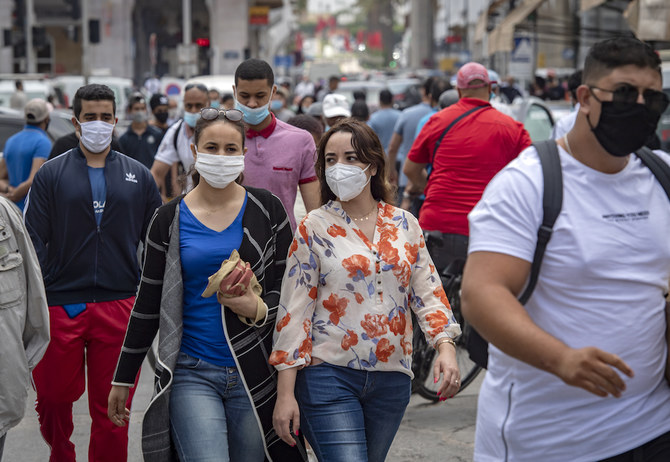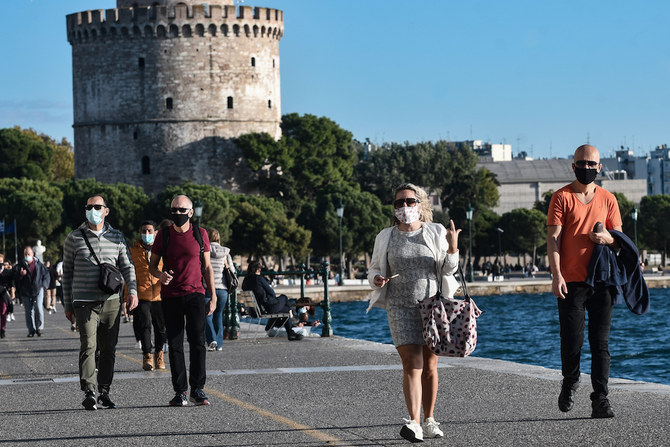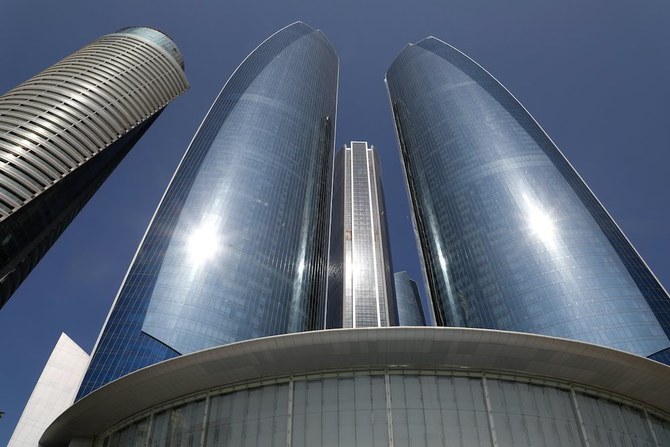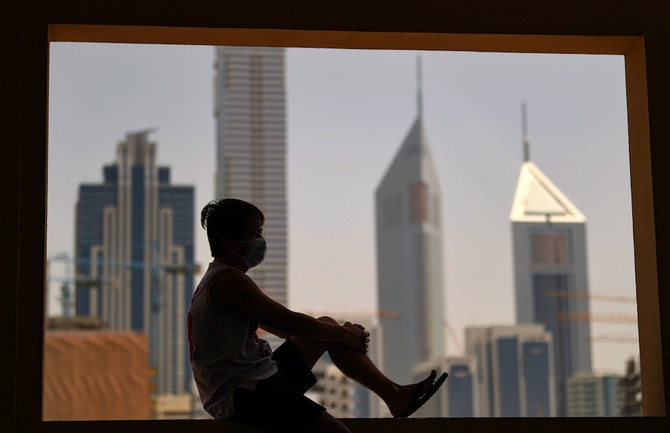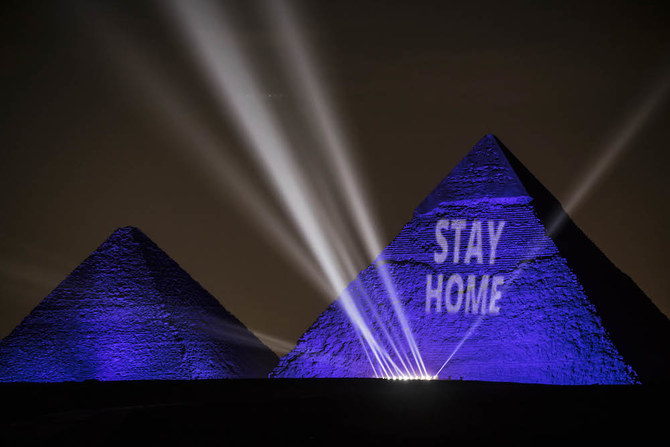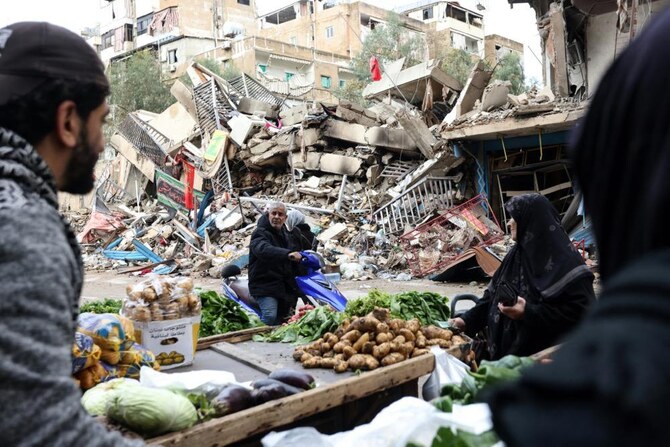DUBAI: History is full of examples of mighty cities brought to their knees by deadly disease outbreaks. While COVID-19’s global toll is miniscule compared with the ravages of, say, the Black Death during the Middle Ages, the sheer scale of urbanization and the interconnectedness of today’s modern economy amplified the impact of the coronavirus pandemic. How different cities adapted to the latest contagion may very well determine their resilience and longevity.
Without a doubt, the COVID-19 crisis has shaken up the existing global urban order and thrown the reputation of several Western cities into question. Yet in many ways, the pandemic has merely accelerated a long-established eastward trend.
In its 2020 Global Cities Index report titled “New priorities for a new world,” management consultancy Kearney examined how the pandemic has impacted urban life and economic competitiveness of the world’s metropolises. This year’s study included data from 151 cities — up from 130 surveyed in 2019 — reflecting the growing importance of urban spaces in the Middle East, China and Central Asia.
Perhaps unsurprisingly, the findings of the 2020 report are very different from previous years, as cities continue to limit entry to visitors, cancel events and festivals, and restrict the free movement and social mixing of their citizens in the hope of containing successive waves of the virus and its latest mutations.
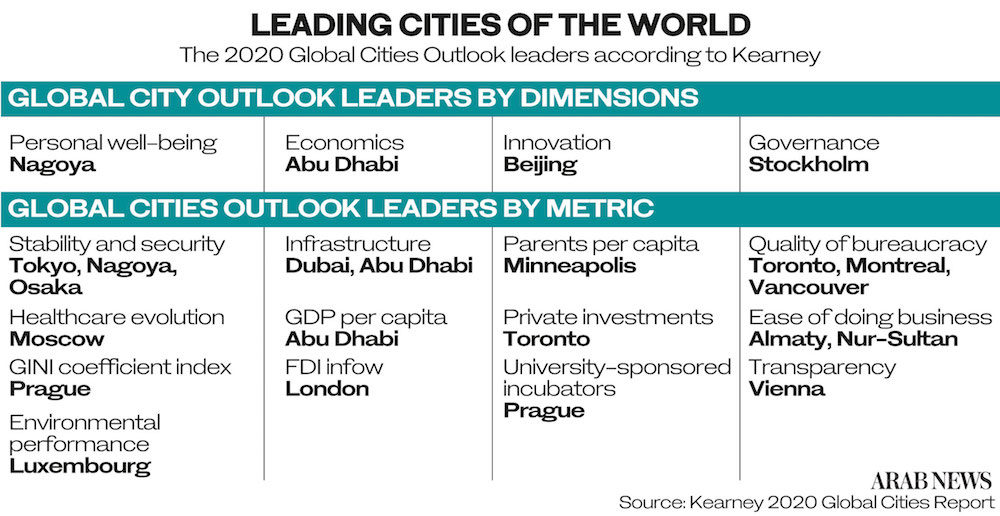
Kearney’s Global Cities Outlook (GCO) suggests that although some well-established contenders have maintained their ranking over the course of the year, others have witnessed a notable change of fortunes — for better or worse.
London, for instance maintained its high ranking in 2020 despite the British capital’s repeated lockdowns and the economic uncertainties of Brexit. Meanwhile, for many rising cities, particularly those in China and the Middle East, it appears that long-term investment in governance and economic infrastructure is starting to pay off as they rapidly close the gap with their American and European peers.
One example is Abu Dhabi, which has risen to 7th place on the index, 13 notches above its 20th ranking in 2019, overtaking Stockholm, Amsterdam and Dublin. The city also topped the economics metric in infrastructure, which, as the report states, was “thanks to its openness to the private sector and robust engagement in public-private partnerships.” This boosted per capita gross domestic product (GDP) and foreign direct investment.
Dubai also has cause to celebrate, climbing 14 points in the index to rank 18th, up from 34th in 2019 and 41st in 2018. Meanwhile in Asia, Singapore dropped a notch to 3rd whereas Tokyo climbed two ranks to 4th. Although they have not emerged unscarred by the pandemic, these Eastern powerhouses are primed for significant growth in the coming years.
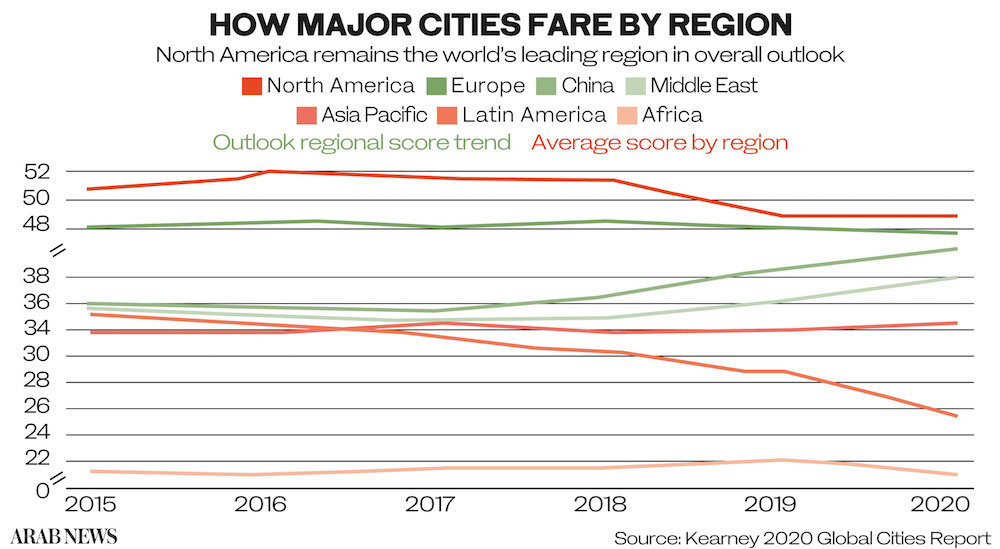
Dr. Parag Khanna, managing partner at FutureMap, a consultancy firm analyzing trends in globalization, says the world can be divided into two categories now. “The places that shifted together and are going to figure out how to move ahead and those that have not been successful at sticking to a plan,” he told Arab News.
“Countries such as the UAE, Kazakhstan and Singapore are all countries that are going to come out of the pandemic not necessarily better tomorrow but in the hierarchy of countries that had a plan and are going to stabilize a profit in the years ahead.”
Kearney’s analysis suggests that in order to emerge stronger and more resilient from the current crisis, city leaders have been forced to reimagine what comes next.
Its study covers four dimensions — personal well-being, economics, innovation and governance — which are key determinants of a city’s ability to attract talented human capital, generate economic growth, increase competitiveness and ensure stability and security.
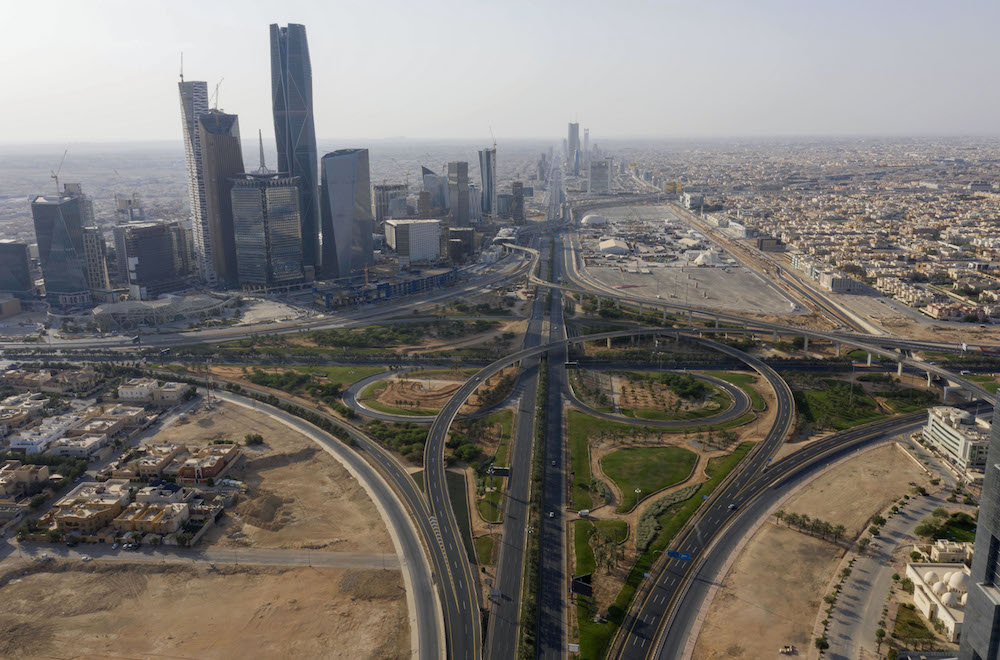
An aerial view shows King Abdullah Finance City and the northern ring road which remains empty due to the COVID-19 pandemic, on the first day of the Eid al-Fitr feast marking the end of the Muslim holy month of Ramadan, in the Saudi capital Riyadh, on May 24, 2020. (AFP/File Photo)
It stresses the need for “urban value creation,” meaning that in order to remain relevant and competitive in a post-pandemic world, “global cities will need to deepen their focus on creating public value — that is, value centered on the common good across all sectors and segments of society.”
Other top priorities are promoting “global city connectedness” — meaning the international flow of goods, ideas and people — and “the transformation of urban space” — placing the onus on urban leaders “to address the many challenges tied to physical space that have been so starkly revealed by the pandemic.”
Khanna says the coronavirus crisis has shown that some countries need to slow down and re-evaluate. “It is more important now to fix the cities that you have than to build new cities that you don’t necessarily know if you are going to need in the future,” he said.
“When you are looking at cities now you need to ask yourself the following: Which cities are stable and successful? In what cities are people recongregating? Which cities are going to attract young talented people who could now be anywhere in the world because of remote work? And could Dubai or Riyadh or Tel Aviv or Istanbul or Muscat be that place?”
A case in point is NEOM in Saudi Arabia. Before the pandemic struck, the world watched expectantly as Saudi Arabia outlined its plans for the futuristic smart city located in the northwest Tabuk province.
With the global public-health crisis expected to catalyze the digital transformation of different sectors, “NEOM has an unprecedented opportunity to become the first health technology capital of the world, and a global hub for innovation and cooperation in health and wellness technology,” wrote Roxana Mohammadian-Molina, chief strategy officer at London-based financial technology company Blend Network, in a commentary for Arab News in July last year.
As for the Saudi capital, Afshin Molavi, senior fellow at Johns Hopkins School of Advanced International Studies, said: “Riyadh is making many of the right moves, particularly in its upgrading of transport infrastructure and the expansion of entertainment offerings.
“If it continues to move in this direction, I could envision Riyadh landing on most of the top regional urban indexes over the next few years.”
The pandemic does appear to have accelerated a trend that has long been in evidence — the shift of business eastward, with major economic centers opening in China, Southeast Asia and the Middle East.
The continued rise and apparent pre-eminence of the East during this challenging period may also have something to do with planning, allocation of resources and leadership.
“The rise of the East has nothing to do with the fall of the West,” said Khanna. “The global economic pie was growing for centuries and certainly for decades during the entire post-Cold War era.
“The rise of the East began the second the atomic bombs were dropped in 1945 because that’s when Japan started to reinvent itself as a peaceful country. Japan then took exactly 30 years — from 1945 until 1975 — to become the world’s second largest economy.”
Khanna says many countries in the East have withstood the harsh punishment of the coronavirus pandemic thanks in part to sound socio-economic planning. “This reinforces the Asia-centricity of the coming era,” he said.
During this time of global fragmentation, there has also been a noticeable resurgence in economic activity along regional lines. “You don’t have de-globalization but an enhancement in regional cooperation,” said Khanna.
“It’s not an accident that reconciliation with Qatar is happening more now or the normalization of relations between the Israel-UAE or the recent Regional Comprehensive Economic Partnership (RCEP) — the big trade agreement that has just gone ahead in the midst of a pandemic, because Chinese, Japanese, Vietnamese, Thais and Koreans realize that for the foreseeable future, they are going to trade a lot more with each other rather than across the vast oceans.”
Small wonder then, as the Kearney report concludes, the cities that are emerging on top are the ones that have long been innovating for the future, that have stuck to sound plans, and those that have strengthened their regional ties for the bumpy road ahead.
----------------
Twitter: @rebeccaaproctor


